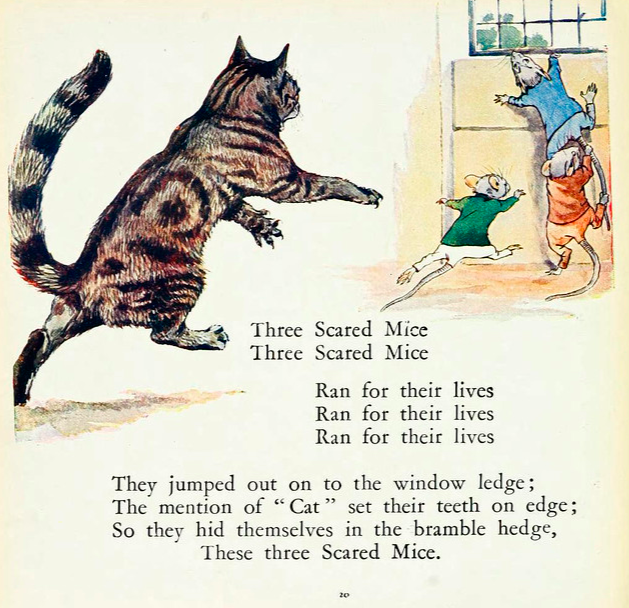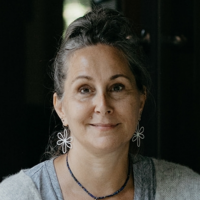Sometimes I wonder why we react to things the way we do.
Why do we fear mice and not the cats who kill them? Why do certain smells evoke a feeling? Why do we behave in violent, racist, or sexist ways, when we may not consciously and actively choose to?
I heard mindfulness teacher Kaira Jewel Lingo recently share a story that helped me think about these reactions in a new way. She recounted one of the first experiments to prove that trauma and traumatic reactions are passed down through generations.
The Mice
In this study, the offspring of mice who had previously experienced electric shocks whenever they were exposed to a certain chemical, themselves became fearful when they smelled that chemical. Even though these offspring had never experienced any electric shocks. They had only inherited their parents’ reactions.
When one of the younger generation mice smelled something, that to them was completely new and innocuous, they exhibited a fearful “startle” response. They had no memory to be afraid of, yet they were afraid.
What we feel and react to might not always be coming from our own lifetime. And, if we think, “Oh, this must be coming from my parents,” that may also not be true. Our parents have inherited feelings and reactions from their parents.
There is an Indigo Girls song I’ve always liked that includes the lyrics:
“And then I think about my fear of motion
Which I never could explain
Some other fool across the ocean years ago
Must have crashed his little airplane.”
Conditioning
In Buddhism, we refer to this kind of contagiousness of feelings and reactions as conditioning. It’s more obvious how we have been conditioned by our environments and our childhoods, but the mice proved that we have been conditioned by our ancestors’ lives and actions as well. Moreover, with every situation we are in and every action we choose to take, we condition our descendants, too.
As a student of mindfulness, what does this mean? First, we need to explore our influences, whether blood relatives or not. What did my ancestors experience?
When we have a reaction, we can learn to pause and check-in with ourselves to see if this is a truly necessary reaction (do we need to fight or flee?) or is it something bubbling up from our conditioning. If we were in the situation of the mice, we might pause and think, “This smell is making me feel afraid. Is there something right here and now for me to be afraid of, or could this be conditioning? Am I safe here?”
No origination
The other shift that this realization makes is that we can’t effectively judge and condemn our parents (or anyone) anymore. That’s because we can be pretty sure some, if not all, of their problematic reactions were passed down from their ancestors. Nothing much originated with them. And this applies to us too. Rather than be self-critical, we can acknowledge that we are quite literally a product of our families.
“There are people who are angry with their mother, and they feel the same. They want to forget her. They don’t want to have anything to do with her. Is this possible? No. They are the continuation of their mothers. They are their mothers. They cannot escape.” ~ Thich Nhat Hanh, Dharma Talk, 1997
What can we do?
If we keep going on this line of thinking, it may lead us toward despair or feeling like nothing we do matters. But is that really true? Maybe we are the ones who can break a cycle of fear and trauma being passed down or at least recognize that the fear we feel isn’t real and make a different choice. Humans usually have more options than mice.
Our conditioned feelings are both real and not real. They are real because they are happening. And they are not real because there is nothing happening here and now to create these feelings.
When we see a mouse, we feel like we are in danger, but this conditioning doesn’t actually keep us safe because mice can’t hurt us. In fact, once I was so terrified at finding a mouse in my bedroom (thank you Momma Cat) that I screamed and threw my hand back into the wall, breaking my ring finger. My conditioned response increased the harm I experienced.
Of course, there are much deeper traumas and fears that we have inherited from previous generations. Those of us whose families experienced genocide, slavery, or other violent and oppressive treatment carry those experiences. Our ancestors’ suffering continues inside of us. Zen Master Thich Nhat Hanh invites us to heal our ancestors inside of us by taking compassionate loving care of them and of ourselves. This practice is another important part of healing from inherited feelings.
Start with the body
It all starts with coming home to our bodies. When we sense our breathing, when we know that we are rooted into the Earth, when we can listen or look around and find our place in this moment, then we are able to sense what is real and what is not real.
From this, we’ll know what fear feels like in our bodies. It may feel like tightness in the belly, clamping in the jaw, nausea, or something else. Whether our conditioning was from a previous generation or a previous time in our own life, it’s the same practice of coming home to our body in the present moment. We ask ourselves: Am I sure that this is real right now? Am I safe?
Practicing this way, we will be empowered to see and feel beyond our conditioning and make choices to act in ways that are more aligned with our deepest intentions. If we are carrying generations of oppression, we can see that there may be situations of spaciousness beyond our ancestors’ suffering. If we carry generations of oppressor energy, we can break the habit of colonizing we carry from our ancestors.
Like the mice, we humans carry much of our ancestors’ burdens. Unlike mice, however, we don’t have to believe and act on everything we feel.
~









Read 0 comments and reply